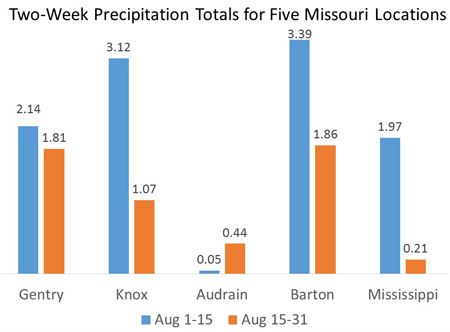Dry Weather In August May Decrease Yield Potential Of Missouri Crops
DR. WILLIAM J. WIEBOLD
COLUMBIA, MO.
Wet spring weather is the gift that keeps on giving. Wet weather during and after planting increases the possibilities of soil compaction and root diseases. These lead to smaller and less healthy root systems on corn and soybean plants. Smaller root systems means that plants are more vulnerable to dry weather during grain-fill. A scenario that is most detrimental to grain-crop yield is a wet spring followed by dry weather during grain filling. Weather conditions that include bright sun, warm temperatures, low relative humidity, and wind increases water demand by plants. If roots are small or unhealthy they cannot supply enough water and plants become stressed. Stress during grain filling reduces yield.
Normally, July weather affects corn yield and early to mid-August weather affects soybean yield. But, with delayed planting in 2015 the most influential periods have shifted two to four weeks later than normal. So, precipitation amounts throughout August will influence corn and soybean yields this year.
The following graph presents precipitation amounts for August in five counties distributed among corn and soybean production areas of Missouri. For good to excellent grain yields, about 1.2 inches of rain are required each week during grain-fill. Only two location received more than 2.4 inches in early August. None of these five locations received adequate precipitation in the last half of August. Northeast Missouri, including Audrain County, has been especially dry. This region is more vulnerable to drought stress because soils in a large portion of the region contain a clay-pan that restricts water drainage in spring and reduces root depth throughout the growing season.
We had hoped that the unusually wet spring this year would be followed by above average precipitation in August. Unfortunately, that is not the scenario that has occurred in much of Missouri in 2015. Delayed planting reduces yield potential, but the amount of lost yield can be greatly reduced if Mother Nature cooperates. However, less than average August rainfall occurred in parts of Missouri. Drought stress symptoms on plants are common in Missouri fields, especially where soil holds less plant available water because soil texture (too much clay or sand) of compaction. Rain that falls this week will help, but yield potential has probably decreased because of dry August weather. ∆
DR. WILLIAM J. WIEBOLD: Professor, Division of Plant Sciences, University of Missouri
